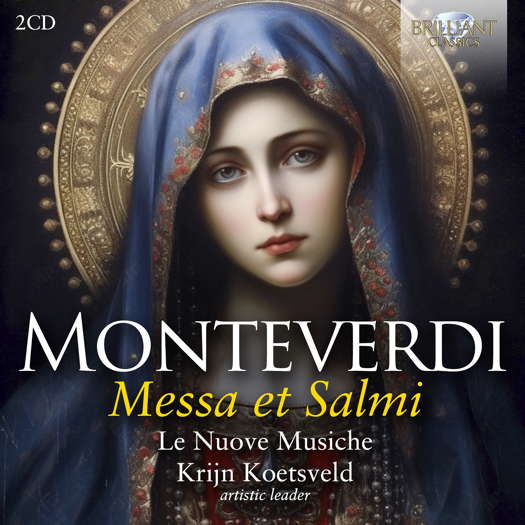 UPDATES: There's a new feature every day at Classical Music Daily. Read about the various ways we can keep in touch with you about what's happening here.
UPDATES: There's a new feature every day at Classical Music Daily. Read about the various ways we can keep in touch with you about what's happening here.
- Glossa Music
- François Bourne
- Bucharest
- Ramón Tapales
- Piers Adams
- Alexander Pushkin
- Teatro Malibran
- Bottesini: Elegies
 VIDEO PODCAST: John Dante Prevedini leads a discussion about Classical Music and Artificial Intelligence, including contributions from George Coulouris, Michael Stephen Brown, April Fredrick, Adrian Rumson and David Rain.
VIDEO PODCAST: John Dante Prevedini leads a discussion about Classical Music and Artificial Intelligence, including contributions from George Coulouris, Michael Stephen Brown, April Fredrick, Adrian Rumson and David Rain.

A Near Unforgettable Experience
GERALD FENECH praises Krijn Koetsveld and Le Nuove Musiche for their new Monteverdi recording
'... breathtaking precision and technical proficiency that are simply stunning.'
Claudio Monteverdi (1567-1643) was born the son of a Cremonese barber-surgeon and, from an early age, he displayed his talents as a composer. When only fifteen his first book of three-part motets was published in Venice. In 1587 he published the first of nine books of madrigals.
This remarkable run was capped by his appointment at the Mantua Court in 1592, initially as a viol player. The composer married one of the court singers, Claudia de Cataneis, by whom he had two sons and a daughter. By the time he was appointed maestro di cappella at Mantua in 1601, Monteverdi was widely recognized as a distinguished composer, a reputation further enhanced by the publication of his Fourth and Fifth Book of Madrigals in 1603 and 1605.
Monteverdi's period in Venice proved a fitting climax to his career. In 1619 he published his Seventh Book of Madrigals, which further developed the harmonic audacity of his previous volumes, while in 1624 his hybrid entertainment Il Combattimento di Tancredi e Clorinda created a sensation at its premiere.
Sadly, not all of Monteverdi's finest music survived. Only one trio of his 1630 opera Proserpina Rapita is extant, and the 'Gloria' is all that remains of a 1631 Mass of Thanksgiving specifically written for St Mark's.
He might well have laid his operatic pen down forever had it not been for the opening of the first public opera house in Venice in 1637, for which he wrote three final masterpieces: Il Ritorno di Ulisse in Patria (1640), Le Nozze d'Enea con Lavinia (1641, lost) and L'Incoronazzione di Poppea (1642). Monteverdi died the following year and was laid to rest in the Church of the Frari in Venice.
Considered the most important composer of his time, Monteverdi stood at the crossroads of one of the most crucial periods in musical history, and today his works, particularly those for the voice, are still very much in the repertoire of many choral groups and individual soloists.
Now to this wonderful disc. Seven years after Monteverdi's death, the Venetian publisher Alessandro Vincenti, with the help of composer Francesco Cavalli, decided to put together the compilation Messa a quattro voci e Salmi. It was a unique tribute to Monteverdi.
Listen — Monteverdi: Credo (Messa a quatro voci)
(96880 CD1 track 3, 0:00-0:58) ℗ 2024 Brilliant Classics :
In an era when looking back was not fashionable, the preservation of written music was rare and, for the most part, the names of dead musicians were quickly forgotten. Monteverdi's fame, however, seemed to persist for a long time. In 1641 Monteverdi himself had compiled the collection Selva Morale e Spiritwale which the composer considered to be his finest work.
But there were many more pieces that were in the league of Selva Morale ..., and Vincenzi and Cavalli had plenty to choose from when putting together this beautiful compilation, to which Cavalli added his own Magnificat.
Listen — Cavalli: Magnificat
(96880 CD1 track 14, 0:00-0:54) ℗ 2024 Brilliant Classics :
Alongside the Messa a quattro voci in the old contrapuntal style, there is a lot of other impressive music. Indeed, we find the Confitebor tibi in two different versions which give us a deep insight into how the great master worked.
Listen — Monteverdi: Confitebor tibi I
(96880 CD1 track 8, 0:37-1:18) ℗ 2024 Brilliant Classics :
Listen — Monteverdi: Confitebor tibi II
(96880 CD2 track 9, 0:50-1:39) ℗ 2024 Brilliant Classics :
We also know that Monteverdi looked back to the old contrapuntal techniques in his church music. The Laudate pueri, Laetatus sum, Nisi Dominus II and the Lauda Jerusalem for five voices are good examples of this. In contract to this are works where he looked forward, where he translated the concertante practice into psalms such as Nisi Dominus I and the intoxicating Beatus vir.
Listen — Monteverdi: Beatus Vir
(96880 CD1 track 13, 0:00-1:00) ℗ 2024 Brilliant Classics :
In the Laetatus sum he lets the infinite possibilities over an infinitely repeating bass be heard.
The second CD begins with a Mass that was written as an opening piece for the Marian Vespers, the Missa in illo tempore. And with this we complete the circle.
Listen — Monteverdi: Agnus dei [2] (Missa in illo tempore)
(96880 CD2 track 7, 1:26-2:07) ℗ 2024 Brilliant Classics :
In 1610 Monteverdi began a church-music career that lasted until his death, and much of this incomparable music became notable for the enormous variety of styles he employed. We should be grateful that Vincenti and Cavalli, perhaps driven by commercial interests, left us this extra treasure.
Le Nuove Musiche perform this programme with breathtaking precision and technical proficiency that are simply stunning. Indeed, the music's variety and intensity are made to sparkle in all their brilliance. All praise to Krijn Koetsveld, who coaxes his singers with all the finesse required to make of these pieces a near unforgettable experience. Sound and presentation are a joy for the senses. Do not miss this music made in heaven.
Copyright © 14 March 2024
Gerald Fenech,
Gzira, Malta



